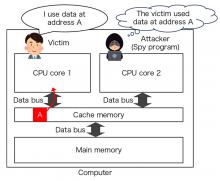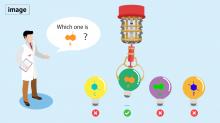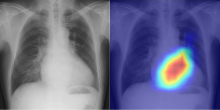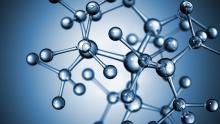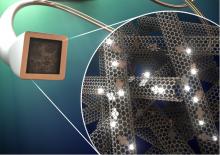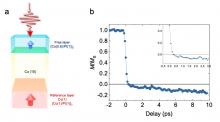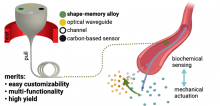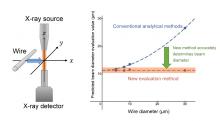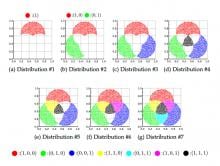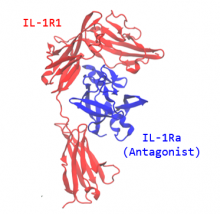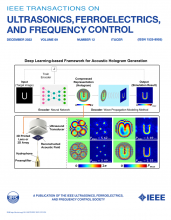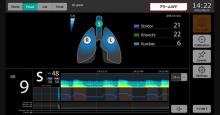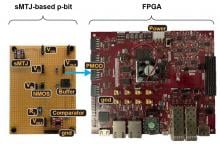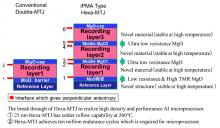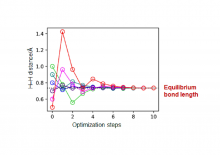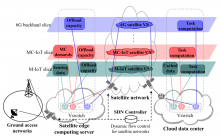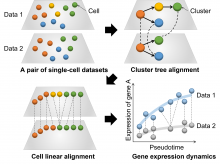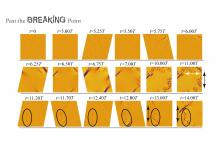Computer Science
News
01 Aug 2023
Cache side-channel attacks exploit vulnerabilities in computer operating systems and are notoriously difficult to counter. Now, a group of international researchers has a new and highly efficient cipher for cache randomization that helps strengthen computer security against these attacks
31 Jul 2023
Researchers from Osaka University have demonstrated a proof-of-concept for identifying single nucleotides by using quantum computing. Molecular rotation patterns—and the corresponding variations in conductance—within the nanoscale gap between two electrodes enabled the development of a quantum gate for the nucleotide adenosine monophosphate. Developing quantum gates for the other three nucleotides, and incorporating this technology into DNA sequencing workflows, could revolutionize genome analysis.
06 Jul 2023
Osaka Metropolitan University scientists have successfully developed a model that utilizes AI to accurately classify cardiac functions and valvular heart diseases from chest radiographs. The Area Under the Curve, or AUC, of the AI classification showed a high level of accuracy, exceeding 0.85 for almost all indicators and reaching 0.92 for detecting left ventricular ejection fraction—an important measure for monitoring cardiac function.
04 Jul 2023
- Joint research team of DGIST Professor JeongHo Kwak and KAIST Professor Jihwan Choi develops a network slicing planning and handover technique for next-generation 6G low LEO satellite networks
- This work is expected to contribute to various services using satellite networks in the era of 6G satellite networks in the future such as Starlink and OneWeb
29 Jun 2023
The brain is a highly efficient, sophisticated information processing system. To achieve maximum efficiency, it can store reservoirs of interconnected nodes that transform input signals into a more complex representation. This has inspired a theoretical computational model known as reservoir computing. A research team has recently harnessed this model to analyze the computational capabilities of an artificially cultured brain composed of neurons derived from the cerebral cortex of rats.
23 May 2023
Two key challenges in chemistry innovation are solved simultaneously by exploring chemical opportunities with artificial intelligence.
17 May 2023
To improve the therapeutic techniques to treat those with brain disorders, researchers have developed microscopic, thermally-drawn microelectronic fiber-based neural probes as a means to manipulate both electrical and chemical signals in the brain. Now, a researcher from Tohoku University’s Frontier Research Institute for Interdisciplinary Sciences has led a group that increased the functionality of these fibers by equipping them with neurochemical sensing aptamers.
02 May 2023
Philip M. Parker, INSEAD Chaired Professor of Management Science and founder of the INSEAD AI lab called TotoGEO, has developed TotoPoetry – a poetry generator trained on a rule-oriented approach to AI.
10 Apr 2023
AI finds the first stars ✨were not alone, Auto-switch for large electronic devices, A metabolite against autoimmune diseases, & Converting fruit waste 🍊🍉into solar stills. Plus in our blog: A career worth doing, a life worth living. Read all in the latest Editor's Choice.
16 Mar 2023
Annual innovation event brings together global innovators, entrepreneurs, researchers and scientists, and experts from various fields and industries to showcase their latest innovations, share ideas, and collaborate with industries to develop better technologies and solutions to shape our future. This is also a platform for innovators to meet potential investors and partners.
10 Mar 2023
Researchers from the Université de Lorraine and Tohoku University have demonstrated sub-picosecond magnetization reversal in rare-earth-free spin valves. To date, ultra-fast magnetization control without using magnetic fields was only seen in material systems using rare-earth materials. But the recent breakthrough is expected to open up new pathways for developing ultra-fast and energy efficient applications.
08 Mar 2023
Tactile sensations could soon be coming to virtual reality, surgical robotics and prosthetic sensing.
03 Mar 2023
Machine learning algorithms allow analysis and characterization of the atomic arrangement of silicon surface superstructures without the need for human expertise.
03 Mar 2023
Moving parts in mechanical come into regular contact, leading to wear and tear. Now, researchers at Tohoku University have developed a contact control system, driven by artificial intelligence, to greatly reduce contact between damaged parts.
09 Feb 2023
A research team led by an associate professor at Tohoku University has developed a microscopic fiber equipped with actuators and biochemical sensors. The breakthrough could be used to develop smart catheters and lead to further advancement in robotics.
07 Feb 2023
A research group at Osaka Metropolitan University has derived a new evaluation method for the measuring the size X-ray microbeams (diameter) through mathematical analysis. The group then verified the validity of the mathematically derived evaluation method by measuring the diameter of X-ray microbeams using metal wires of various diameters with an X-ray fluorescence analysis system for small areas and found that it was possible to calculate the beam diameter more accurately than the previous conventional evaluation method.
31 Jan 2023
A research group at the Osaka Metropolitan University Graduate School of Informatics has developed a new learning method for artificial intelligence that combines classification performance for data with multiple labels with the ability to learn continually from data. Numerical experiments on real-world multi-label data indicate that the new method outperforms conventional approaches. The simplicity of this algorithm makes it easy to integrate it with other algorithms to devise new ones.
29 Dec 2022
- DGIST Professor Hwang Jae-yoon's team proposed a deep learning network and learning framework that allow the free composition of ultrasonic beam shape in real time
- Published in the cover of the December edition of the international academic journal ‘IEEE Transactions on Ultrasonics, Ferroelectrics, and Frequency Control’
- Expected to lead to the development of patient-specific precision stimulation technology in the field of ultrasound brain stimulation and treatment for Alzheimer's disease, depression, and pain
16 Dec 2022
Scientists developed a novel device that predicts whether an ICU patient taken off mechanical ventilation is likely to suffer from respiratory emergencies, helping critical care teams to provide immediate life-saving interventions.
14 Dec 2022
- DGIST Professor Jin Kyong-hwan’s research team develops algorithm that has 3dB higher resolution than existing algorithms and compatible with various warping domains
- Published in ‘ECCV’, an academic journal with global authority in the field of vision technology
07 Dec 2022
As the revolution in machine learning and AI takes place, the limits of conventional computers are being reached. Probabilistic computers, which harness naturally stochastic building blocks called probabilistic bits, are likely to usher in an era of more sophisticated computing. Now, an international collaborative research group has announced the development of a scaled-up a spintronic probabilistic computer.
07 Dec 2022
A research group has announced a new iPMA-type Hexa-technology in Magnetic Tunnel Junctions (MTJ) that unlocks the door to improving ultra-low power in IoT edge-devices, mobile, automotive, consumer electronics, and applications operating in harsh environments, such as autonomous vehicles, industrial robots, and space applications.
29 Nov 2022
Using a quantum computer, Osaka Metropolitan University researchers utilized quantum logic circuits to directly calculate, in a single calculation, the energy difference between two molecular geometries. The developed method was then applied to execute the molecular geometry optimization of typical molecular systems. On a classical computer, calculations based on the finite difference method require at least two evaluations of the energy for one-dimensional systems, but previous research has shown that a quantum computer can be used to calculate the energy derivatives based on this method in a single calculation. However, quantum circuits relevant to quantum algorithms capable of performing the energy derivative calculations had not been implemented. The research group has successfully created a quantum circuit to calculate the energy derivatives by modifying the quantum circuit used in the previously developed quantum phase difference estimation algorithm.
18 Nov 2022
Exploring virtual human-agent relationships, A fly protein gives clue for human cancers, Rare earth elements formed in neutron star mergers 💥, One-stop process for hydrogen production. Read all in the November's Editor's Choice plus Upcoming event K4DM KNOWLEDGE MARKETPLACE – Bangkok 2022: Exchanging Ideas for a Democratic Myanmar.
03 Nov 2022
Researchers from Osaka University have demonstrated a proof-of-concept for a novel use of artificial intelligence for enzyme engineering that does not require an enzyme’s crystal structure. By analyzing the amino acid sequences of malic enzymes from various living organisms, the researchers identified the amino acids that are pertinent to using different redox cofactors. The results of this work will facilitate retooling enzymes in research laboratories and the biotech industry.
30 Oct 2022
New research identifies a unique way that people find connection in the modern world and provides novel insight into the fields of anthropomorphism, virtual interactions, and relationship science.
19 Oct 2022
- A joint research team led by Professor Jeongho Kwak of DGIST and Professor Jihwan Choi of KAIST developed efficient edge-computing offloading and network-slicing techniques for next-generation LEO satellite networks.
- This technology, which has drawn Elon Musk's attention, is expected to be used for high-speed streaming and computing services in communication-isolated areas during the era of “future satellite networks.”
14 Oct 2022
Researchers from Osaka University have developed a computational analysis tool called CAPITAL for comparative analysis of single-cell RNA sequencing data with complicated branching trajectories. As cells undergo a dynamic process, they can be placed on a “pseudotime trajectory” to analyze the gene expression changes throughout the process. While previously only straightforward linear trajectories could be compared, CAPITAL is proven to be able to accurately compare branching trajectories, significantly advancing the field of high-throughput single-cell sequencing.
11 Oct 2022
Researchers at The University of Tokyo simulated fractures in amorphous materials due to both cyclic fatigue and constant stress using course-grained dynamics, and demonstrated various failure modes, which can help improve reliability of materials
Events
Sorry, nothing coming up for this discipline
Researchers
Sorry, nothing coming up for this discipline
Giants in history
Sorry, nothing coming up for this discipline


